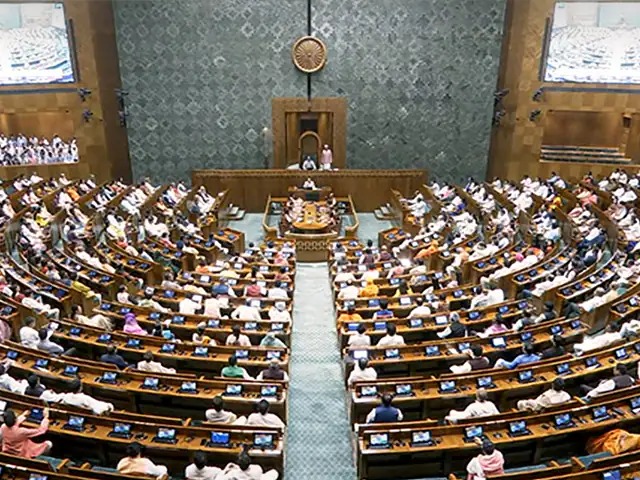Date : 30/10/2023
Relevance –GS Paper 2 - Polity
Keywords – Tenth Schedule, Money Bill, Westminster System, Parliament
Context
The role of the Speaker in India's parliamentary system is pivotal, acting as the custodian of democratic values and the impartial overseer of legislative proceedings. Historically rooted in medieval Britain, the Speaker has evolved into a figurehead representing the House's interests. However, recent instances have raised concerns about the impartiality of Speakers in India, prompting the need for a thorough examination of their functioning and potential reforms.
Historical Evolution:
The institution of the Speaker finds its origins in medieval Britain, where it served as a bridge between the House of Commons and the monarchy. Over time, the Speaker's role transitioned from an agent of the Crown to an impartial Chairman of the House of Commons. In India, this evolution is mirrored, with the Speaker's responsibilities encompassing vital tasks such as certifying Money Bills and deciding on disqualifications under the Tenth Schedule for defection.
Challenges Faced by the Speaker:
One of the primary challenges confronting Speakers in India is the misuse of their powers, especially regarding the suspension of members. Instances where swift action was taken against Opposition members, juxtaposed with leniency towards ruling party members, highlight the issue of partisanship. Additionally, the underutilization of the Speaker's authority to refer Bills to Parliamentary Standing Committees impedes the detailed scrutiny necessary for effective legislation.
The Issue of Defections:
A significant dilemma arises from the Speaker's authority to decide on defections. This power, while essential for maintaining party discipline, has faced criticism for its potential to violate democratic principles. Calls for constitutional amendments, advocating the establishment of an independent tribunal headed by judges, underscore the need for reform in this critical area. Recent legal challenges regarding the certification of Bills as Money Bills by Speakers further emphasize the necessity of addressing these concerns.
The Need for Impartiality:
In the British parliamentary tradition, Speakers resign from their political affiliations upon election, seeking re-election as neutral entities. This practice underscores their impartiality and fosters confidence in their ability to preside over the House objectively. In India, however, such practices are seldom followed, leading to doubts about the Speaker's neutrality. Despite judicial constraints, it is imperative for Speakers to demonstrate impartiality, upholding the democratic values upon which the Indian political system is built.
What are some international practices?
- In Ireland's parliamentary system, the Speaker is chosen based on credibility earned by renouncing political ambitions.
- The Westminster system deems it inappropriate to include the Speaker in the cabinet and ensures their seat by not opposing them in their constituency.
- Contrastingly, in India, several Speakers have lost their seats in general elections, highlighting a difference in political practices.
- Unlike their British counterparts, Indian Speakers are not appointed to the Rajya Sabha after their term, indicating a lack of continuity in their political careers.
- In Britain, the Speaker is automatically elevated to the House of Lords after their tenure, offering a seamless transition to another legislative body.
- The United States stands out by allowing the Speaker to actively engage in politics, a practice unique to its political system, although this is balanced by a stringent separation of powers between the judiciary, executive, and legislature.
Potential Reforms:
- To restore faith in the office of the Speaker, comprehensive reforms are essential. One approach could involve adopting the British practice of Speaker resignation from political parties, emphasizing their role as unbiased arbiters in the House. Additionally, increasing the utilization of Parliamentary Standing Committees for in-depth scrutiny of Bills can enhance the legislative process's transparency and effectiveness
- Furthermore, empowering an independent body, free from political influences, to handle disqualifications under the Tenth Schedule could address concerns regarding the Speaker's impartiality in such matters. This move would align with the recommendations made by the minority judges in the Kihoto Hollohan case, reinforcing democratic principles and ensuring fair decision-making.
Other Recommendation
- The committee chaired by V.S. Page proposed allowing Speakers to continue in the next Parliament if they exhibited impartiality and efficiency during their tenure.
- Prospective Speaker candidates might be mandated to run for office independently, detaching themselves from political parties.
- Speakers, according to the recommendation, should be restricted from pursuing future political roles, except for the position of President.
- In return, Speakers would receive a lifelong pension, ensuring financial security after their term in office.
Conclusion
In conclusion, the challenges faced by the Speakers of the Lok Sabha and Legislative Assemblies demand urgent attention. By embracing impartiality, avoiding impropriety, and implementing reforms that enhance transparency and fairness, Speakers can uphold the sanctity of the parliamentary system. The Indian political landscape stands to benefit significantly from these reforms, fostering public trust in democratic institutions and ensuring the effective functioning of the nation's legislative processes. Only through a concerted effort to uphold democratic values can the Speakers truly fulfill their roles as custodians of parliamentary integrity, paving the way for a more transparent and accountable democratic framework in India.
Probable Questions for UPSC Mains Exam
- Examine the challenges faced by Speakers in India's parliamentary system, highlighting the issues of partisanship, defections, and the need for impartiality. Discuss the potential reforms and international practices that can enhance the role of Speakers in upholding democratic values. (10 marks, 150 words)
- Critically analyze the impact of international practices, such as those followed in Ireland, the UK, and the US, on the functioning of Speakers in India's parliamentary system. Evaluate the effectiveness of proposed reforms, including Speaker resignation from political parties and the establishment of an independent tribunal, in ensuring the impartiality and efficiency of Speakers. (15 marks, 250 words)
Source – The Hindu







